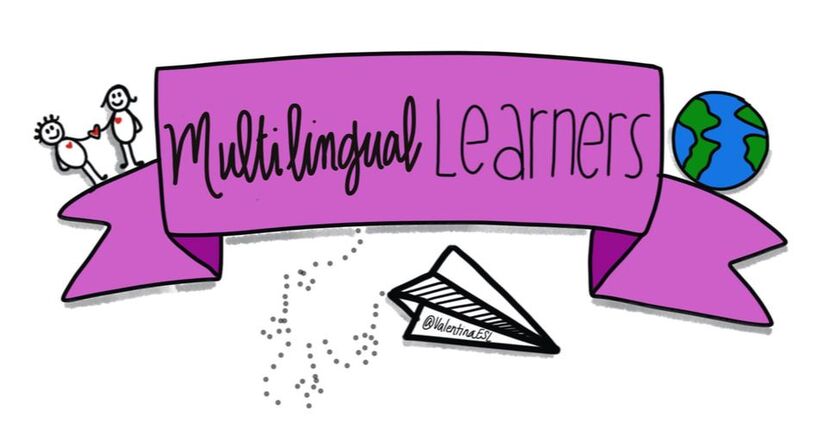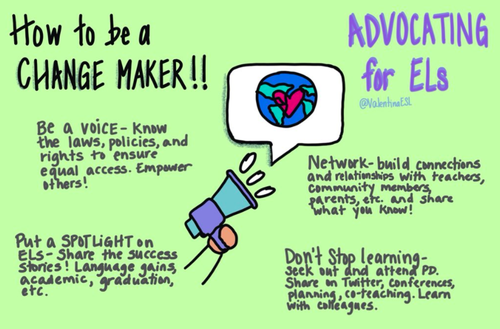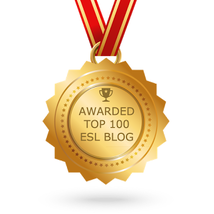advocating for English LearnersWhen I first began my role as an ESL teacher, I have to admit, I didn't know much about ELLs other than my own experiences. My experience growing up as an English learner helped me form my beliefs about language learning and helped me as I worked with ELs in my general education classroom. But the year I left the general education classroom and moved into the role of an ESL teacher who supported all grades, co-taught, and pulled newcomer students out for intense English instruction, I realized that I needed to learn more and do more. I was seen as the ESL/ELL specialist on my campus. And that meant a lot to me. The students were counting on me to support their language development and to support their teachers. I had to step up my game and FAST! 1 KNOW THE LAWS
First and foremost, get to know your local policies and state laws regarding English learners. Understand them deeply and be prepared to share them with your colleagues in an effort to ensure that ELs are receiving equitable education. Attend educational meetings that involve ELL students. If an ELL is being considered for special education, speech or other services, ensure that you are included in the staffing/meeting to act as the voice for the student. One thing I did as an ELL teacher is I set up a meeting with the principal before school started. I wanted to share with her my vision for our ESL team and our goals. And I wanted to ensure that we were valued and supported. This talk was super important. It set the tone for the year. We needed to make sure that our ESL teachers were valued as language specialists, seeing students regularly, co-teaching in classrooms and not being used at substitutes, making copies, or covering cafeteria duty. 2 NETWORK Networking is more than important as an ELL educator. Often there are only a few of us on a campus, sometimes only one. There are some districts that have one ESL teacher that serve the entire campus. We need each other. We can help one another by collaborating, discussing, and sharing ideas. Network with general education content teachers as well. If you are able to plan with content teachers in person, that is ideal! However, sometimes the most feasible way to plan and discuss is online. Set up a system to discuss and plan with general education teacher who serve ELLs. After all, ELLs spend a majority of their day with general Ed teachers. If you are luck enough to co-teach, then use that opportunity to model effective ELL teaching methods as you work in classrooms. Network with parents and community members. Creating a team of supporters helps us realize that we are all working together to help OUR students achieve and succeed. Building relationships with families and community members can only benefit our students. 3 SPOTLIGHT Shine a BRIGHT light on ELL success! Whether success is big or small, be sure to highlight it and make it known. If a student showed growth in reading, share that success with him/her and the parents. If a child make progress on state testing make a big deal of it! Celebrate success! Recently, we noticed that one of our students who entered as a junior high newcomer knowing no English graduated in the top 10 of the class! You better believe we celebrated this success! 4 KEEP GROWING Never stop learning. No matter how long you've been in education, there's always room to grow. Seek out professional development opportunities and ask your administrator to fund you. There are multiple ways to grow in your profession. Nowadays, learning comes in many forms. You can attend state TESOL conferences, smaller local/district PD, or read a professional book (I can recommend a few if you need some help). You can even learn online! Twitter has the potential to keep learning at your fingertips. Simply type in a hashtag such as #ELLs or #ELLchat and you will see all types of tweets with information you can learn from. There's even a Twitter book chat called #ELLchat_BKclub (lead by educators Katie Toppel and Tan Huynh) that helps ELL teachers read and learn together. No matter what, just remember that you are not alone and that you have the power to make change for the English Learners you serve. It's up to you!
Monica
5/4/2018 10:47:02 am
I appreciated the Twitter hashtag info!
valentina gonzalez
8/5/2018 01:27:52 pm
Great, Monica! Thank you for letting me know! Comments are closed.
|
Categories
All
|


 RSS Feed
RSS Feed
